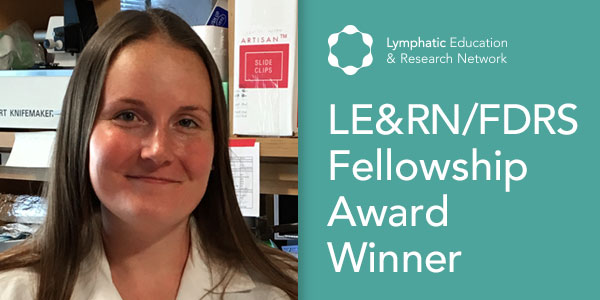Echoe Bouta, Ph.D., at Massachusetts General Hospital and Harvard Medical school under the supervision of Timothy Padera, Ph.D., is a LE&RN/FDRS Research Fellowship Award recipient. We asked Dr. Bouta to tell us more about her research.
What is the focus of your research?
Lipedema is a chronic disorder that results in increased fat in the lower limbs and manifests as dramatic, painful swelling. Clinical studies demonstrate that patients present with at least partial lymphatic dysfunction, further demonstrated by evidence that lipedema increases in severity until lymphedema occurs (lipo-lymphedema). Patients with lipo-lymphedema often suffer from recurrent infections. Unfortunately, the etiology is largely unknown and treatments are often ineffective, demonstrating a need to understand the relationship between fat, lymphatic capability, and immune function at a basic science level to catalyze more effective therapies. My project focuses on understanding this relationship in mice.
What do you hope to learn from this research?
I hope to gain a deeper understanding of how fat formation near lymphatic vessels impairs lymphatic function in an animal model of increased adiposity (obesity). The project focuses on characterizing lymphatic function using a variety of techniques to understand the multiple forms lymphatic dysfunction can take and then dissecting the adipose tissue-driven molecular pathways responsible for the inhibited lymphatic and immune function.
What impact do you foresee this research having on our current body of knowledge?
While lymphatic dysfunction is something that happens in many disease states, molecular causes are still a mystery. We hope to understand better how lymphatic dysfunction happens and what its effect on immune function is on lipedema patients.
What clinical implications might grow out of this research?
I hope to use the molecular pathways I identify that contribute to lymphatic dysfunction to identify therapeutic targets that restore lymphatic function in the presence of increased adiposity. These therapeutic targets will hopefully be translatable to clinic.
What might the field accomplish within the next few years?
The lymphatic field is growing, making this an exciting time for fundamental discovery. Therefore, we are currently building the tools essential to do the rigorous science needed to understand the true implications of lymphatic function in disease. In the last decade, it has become evident that many diseases have a lymphatic component. My hope is that in the next few years, the lymphatic field will be able to start moving further into clinic, including clinical trials focused on targeting lymphatic dysfunctions.
LE&RN programs, like the Fellowship Awards program, are only possible because of our Supporting Members. Become a Supporting Member today, for as little as $5/month.

